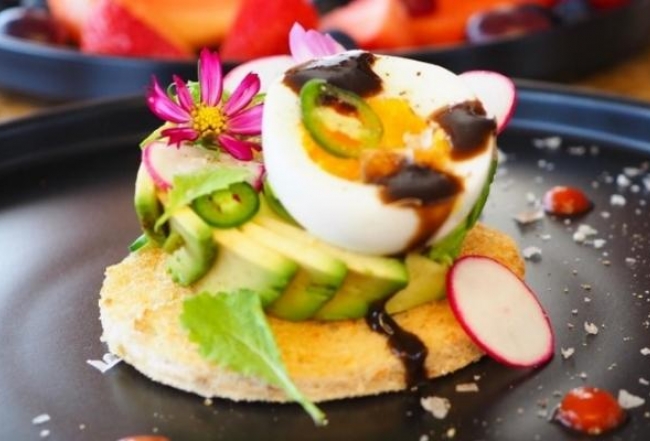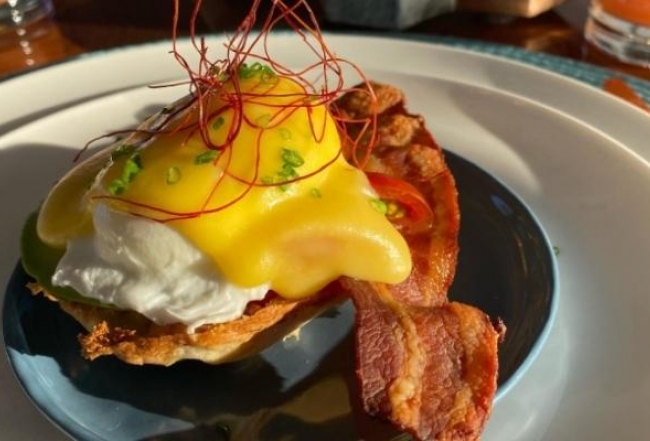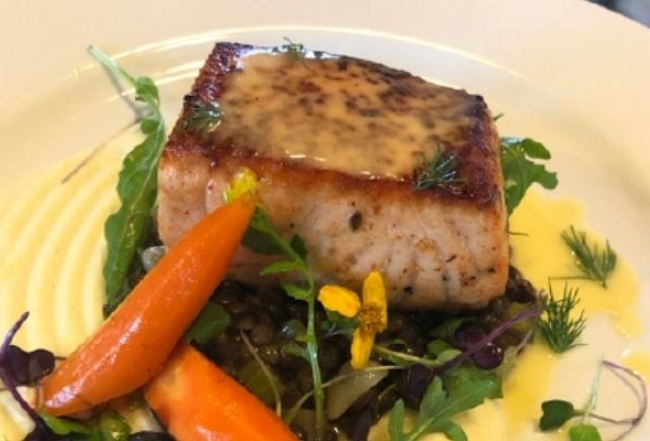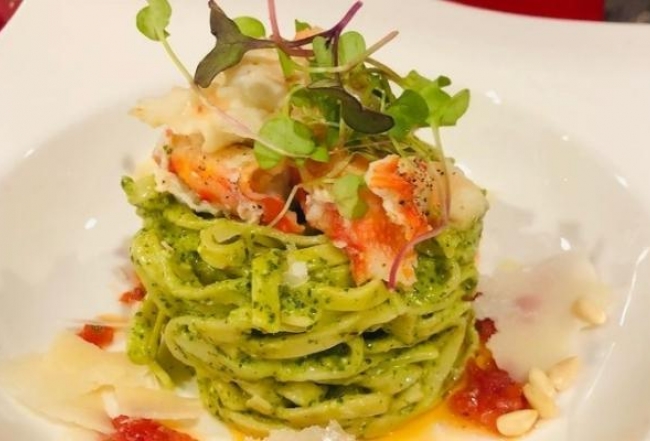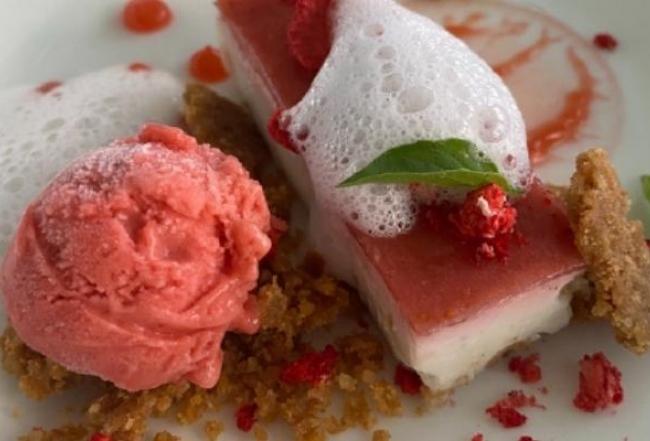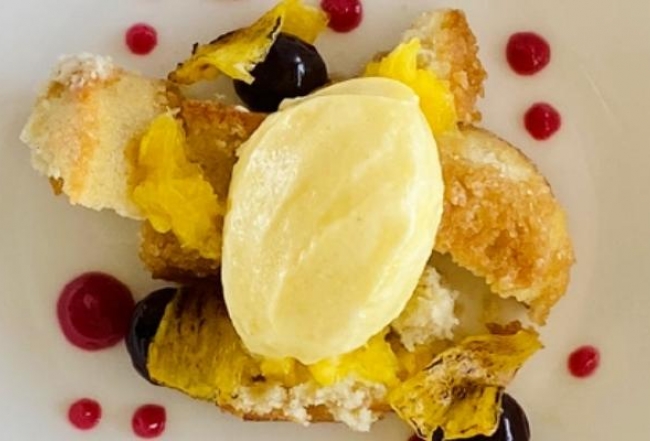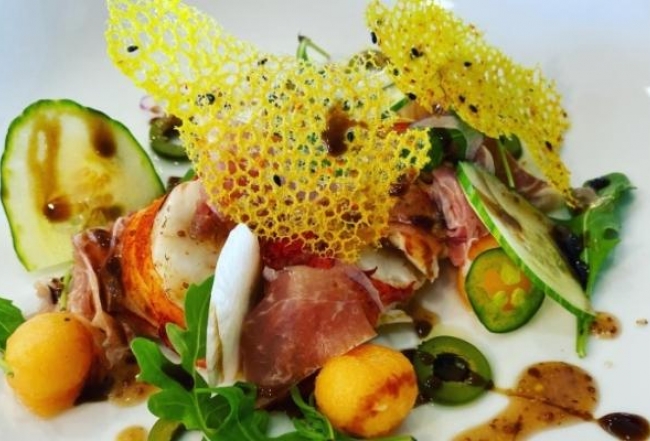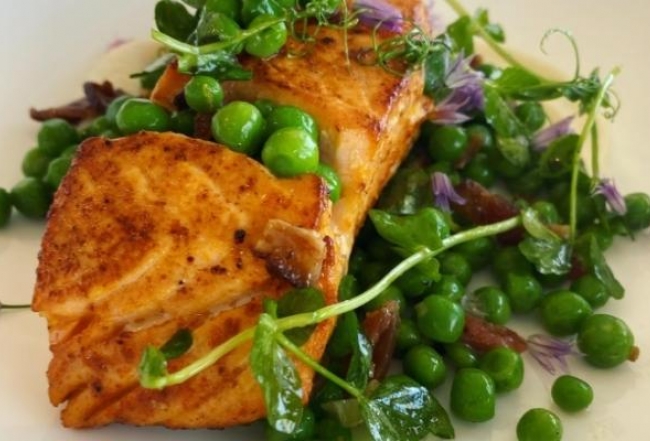Tail Lights
- 35.36m | Azimut | 2011 (2016)
A Michigan native, Chef David Ogren spent many summer days of his childhood on the shores of Lake Michigan, and it was during this time that he discovered his love of cooking.
After attending the Culinary Institute of America in Hyde Park, New York, David went on to work in some of the top kitchens in New York City, Boston and Cape Cod, a highlight of which included working under world famous chef Thomas Keller at the French Laundry in Yountville, California.
Following a successful and fulfilling career in restaurants, David decided to pursue a new direction as a private chef on yachts, and today he cooks up a culinary storm in the Tail Light’s galley.
Here Chef David talks to Superyacht Stories about his culinary career, his signature style and what guests can look forward to during their time on board.
Tell us a little about your background, how did you come to work as a superyacht chef?
It’s a long story! I’ve been cooking my entire life. Some of my earliest memories are food. I grew up in a family that appreciated local, farm to table and organic food, decades before it was cool. I remember picking berries and tree fruit with my grandma as a kid, and I can still taste that jam we made. Often we would go home to the lake cottage where I spent my childhood summers, put the day’s harvest into mason jars for the winter and cook dinner.
When I was around 14, I started working on a golf course as a caddy. From there I moved into the kitchen, I was just drawn to it.
One day the high school guidance counsellor asked me to come to his office. He knew my story and that I liked to cook. He was friends with a local chef that was from New York, and he agreed to give me a job at his restaurant. Joe Pagano was a Culinary Institute of America (CIA) alumni; he took me into his restaurant when I was 16.
That guy used to yell and scream at me, but he also taught me what it meant to work in a professional kitchen. Four days a week, I would drive 45 minutes after school to work in his kitchen. I’m pretty sure he hated me, but he gave me a letter of recommendation which basically guaranteed I would be admitted to the CIA.
I truly fell into cooking school. At the time, the Food Network was just becoming a thing. The internet was dial up, there was no Pinterest, and no real social media. I went to cooking school because I wanted to get out of my house and my parents told me I needed to do something. I had no visions of being a great chef. It just sounded fun.
After the CIA, at age 20 I moved to Boston and got a job at the Westin Hotel, Copley Place. My thought was that I would go and work for a large hotel chain and transfer to their hotels around the world, but it didn’t work out like that. I quit and went to work at a small French Bistro called Aquitaine in Boston’s South End.
Here I was the Sous Chef at just 21 years old and I had the time of my life. I truly learned how to cook and started to find a direction in my career under chef Seth Woods.
During my time at Aquitaine a guy, Eli, showed up out of the blue looking for a job. He was a total college frat guy and I honestly didn’t think he would last a week. To this day he is one of my best friends. He just kept showing up and cooking. We started hanging out and having drinks after work and even ran a seasonal restaurant on Cape Cod a year later. After that summer Eli and I parted ways. I went to go run a restaurant in NYC, Eli went to go work on yachts.
Over the next 10 or so years, I went to work to accomplish what I thought I needed to do, and I had a very weird but successful career in the restaurant industry. Fast forward five years however and I fell out of love with being a chef – I basically downright hated it and I stopped working in restaurants. I started taking classes to change my career and even worked on a farm for a while.
I will never forget the morning I got the call that my mom had collapsed, and she died quickly after from a brain tumour. I learned how truly precious life is and not to waste it. I was pretty lost for a while. I waited tables and bartended for a year. These were some pretty dark times for me however, also the most transformative of my life.
One day I finally decided that I needed to do something with my life again so I decided to double down on being a chef. I still loved to cook but knew that I didn’t want to go back to the restaurant life. I thought about my original aspirations of travelling the world and decided to call my old buddy Eli. His response? “What took you so long man?”. It just so happened that he was about to go on leave from his boat and needed someone to cover his vacation. I flew to Fort Lauderdale later that week and before I knew it, I was working on the biggest, prettiest boat I had ever seen.
I got offered my first full time job on a yacht maybe six weeks after Eli basically threw me headfirst into the industry. That was two and a half years ago. I’ve always just tried to have fun and be positive and to do the best with what I have. That’s gotten me here and the view isn’t bad.
What motivated you to become a chef and where did you train?
I wanted to see the world. My mother was an exchange student in high school and when I was a kid we travelled through South America and Europe visiting her extended family. I think those experiences left a profound and lasting impression. At a very young age, I realized the importance of food and culture.
Upon graduation from high school I packed my bags and moved to upstate New York to begin my training at the Culinary Institute of America. I say begin, because, as a chef I continue to learn and grow. I don’t think that will ever stop.
What’s the most unusual ingredient you’ve come across on your travels?
I was at a small shop on Harbor Island in the Bahamas, looking for pineapples. A guy came to me and tried to sell me Ambergris which is one of rarest things on earth. After a quick Google search it was absolutely what he said it was. I called my friend’s wife, who works in the high-end fragrance world in NYC which is the primary consumer of all the Ambergris found. We debated the risk and reward of me smuggling the highly controlled Sperm Whale bile back into the US. I declined the offer, it wasn’t worth it.
How do you manage special dietary requirements such as vegetarian, vegan and gluten-free?
This is huge in my industry. Basically every group I cook for has a list of special dietary requirements and I embrace it. If you are my guest I will do whatever I can to make sure you have a great experience. I also usually build my menus for that group around the special requests. I don’t like to single them out with a special dish, I just build a delicious menu that works for everyone at the table.
Are you seeing any trends at the moment – what’s on the horizon?
Virtual restaurants. The pandemic devastated the restaurant industry. Delivery services like door dash have capitalized, but also furthered the damage. A normal restaurant is not set up to do delivery and it usually ends up costing them money to fulfill an online order. In the next few years you will see brands emerging with a national presence that have no actual locations. It will be online delivery only and they will use purpose-built kitchens in warehouses. It’s already happening, but will explode as restaurants continue to be squeezed by high labour and food costs.
As well as creating beautiful dishes, do you get involved in table decoration?
I work with a great team of creative professionals and we discuss the entire guest experience. So yes and no - it’s a collaboration.
Who chooses which wines to stock on board?
Our guests and owners. We have wine experts on board that will assist but at the end of the day its whatever our guests want.
What’s your view on sustainable sourcing and buying local wherever possible?
I absolutely try, but, the unfortunate truth is that sustainability and yachting are an oxymoron.
What do you most enjoy about working as a superyacht chef?
Exploring new places. Not just the beaches, but even provisioning for a trip. I think it’s fun finding everything from toilet paper to Champagne on random islands.
As I always say, you will always have bad days. But when I’m having a bad day I still have a great view. Professional yacht crew have the opportunity to see and experience things that are just not attainable otherwise. It’s an adventure. Every day is different, challenging but also very rewarding.
My favourite thing about being a yacht chef is having a talent that I have developed into a very cool life.
What have been some of the highlights and best moments while working on board?
So many epic sunrises and sunsets. There are so many stories.
What is your future ambition – what would you like to do when you eventually move ashore?
I’m going to keep saving my money and investing it. My goal is to buy a sailboat and hopefully sail it around the world with someone I love. True freedom. I love projects, but, the goal is to work when and how I want.
At some point I see owning a piece of property that needs a restaurant, maybe with a small farm or garden.
Who are your chef heroes and who has influenced your style of cooking?
I had the opportunity to meet and have conversations with Anthony Bourdain on a few occasions. I started at the CIA when he was red hot. He was on tour signing copies of his new book “Kitchen Confidential” and I planned to wait in line after class to get my copy signed. For whatever reason I was held up and missed the signing but I still ran to the building where he was supposed to be and the door was locked. Just then, Tony came out of the second set of doors and let me in. He signed my book and we had a chat. Later, when I lived in New York City, I was fortunate enough to share mutual friends with him and our paths crossed a few more times. That guy definitely had an impact on my life. Not really my cooking style, but more what it meant to me to be a chef.
When I’m cooking on boats I think a lot about the old school episodes of “Bobby Flay’s - Boy Meets Grill”. I watched that show religiously and have probably seen every episode. The premise was that he had a very cool apartment in NYC where he would invite people over and cook for them, usually on his patio grill and usually very attractive women. My cooking style really revolves around this joy of bringing people together and ‘breaking bread’ over the table.
What is your favourite type of cuisine and how would you describe your culinary style?
Grilling and open wood fire cooking, Simple meat and potatoes, and a backyard BBQ are some of my favourites. My culinary style leans toward Mediterranean. I enjoy cooking fresh, clean flavours and highlighting local products. I also prepare lots of lean protein, vegetables, and grains. I call it “Yacht Food”. It’s also what I like to eat when I’m out on the water in the sun all day.
What’s your signature dish – what has really wowed your guests?
I get asked this question constantly, but the truth is that I’ve never cooked the same meal exactly the same in over two years of yachting.
It’s like asking what is your favourite song, colour, movie, and book? I play from the ingredients that are available, the season and vibe of my guests.
My signature dish is truly engaging with people and cooking for them. I literally can cook anything.
Where do you get inspiration and ideas for creating your own menus?
My past experiences, the people that I am cooking for, the dishes I have seen and tasted from other chefs. I also will search through Google Images, Pinterest, and Instagram to follow trends and find new techniques.
What’s your favourite restaurant and why?
I go to places that are true to their identity. I’ve eaten at restaurants all over the world and so many lack authenticity. My favourite places do what they say and they do it well, are unpretentious and a good value. The include Southport Raw Bar in Fort Lauderdale, LC BBQ in Kansas City, Roberta’s in Brooklyn, Dutch Girl Donuts in Detroit and Hattie B in Nashville.
Also, anything that Jose Andres has. The Bazaar in Miami is amazing. Jose is an inspiration to all chefs.
What’s the secret to cooking high-quality food on board compared to ashore?
Provisioning. It’s the hardest part. It doesn’t matter how good of a cook you are - without great product you are dead in the water.
What are your favourite destinations in terms of local produce?
There is an organic farm on a mountain top in St. Thomas. You kind of need to know how to get there as the farmer doesn't really like attention or new visitors, but it’s an amazing place.
There are also amazing orchards and fields in Northern Michigan producing some of the best berries, apples, peaches, and cherries that you will ever taste.
Sample Menu
Breakfast
Yogurt granola
Overnight oats with chia, dried fruit and nuts
Fruit / green smoothies / fresh fruit
Bacon, Gruyere and caramelized onion quiche with mixed greens, roasted tomato and herb vinaigrette
Chef’s breakfast potato
Lunch
Chilled seafood - poached shrimp, lobster tail, oysters, clams, crab claws, local ceviche, cocktail sauce, mignonette, lemon - tabasco aioli
Arancini - stuffed risotto balls with a light tomato sauce, arugula and parmesan cheese bibb lettuce salad
Dinner
Tuna poke - sesame marinated yellow fin tuna, coconut sticky rice, avocado, mango, radish, chili, cucumber, Yum Yum sauce
Crispy duck confit - cherry couscous, pistachio pesto, citrus, green olive and feta with bing cherry vinaigrette and grilled broccolini
Passion fruit cheesecake


